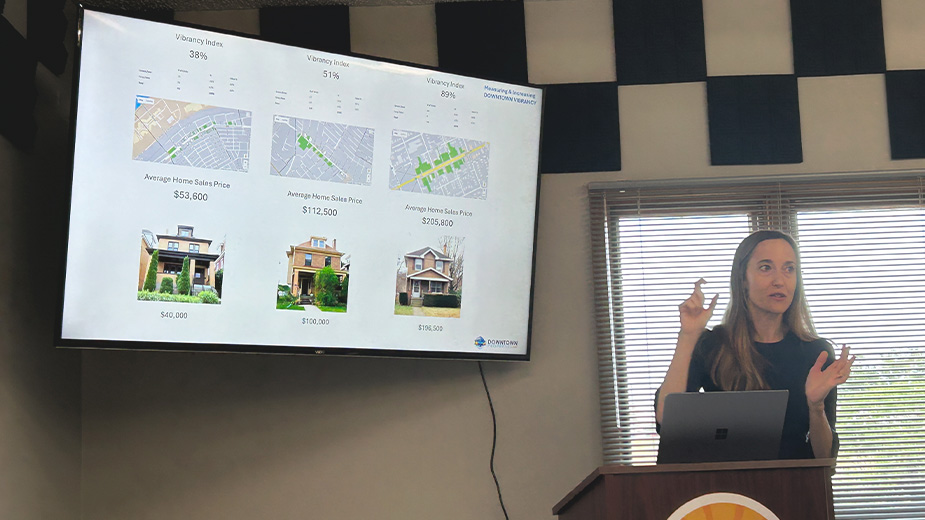United Returning Citizens Guides Transition for Ex-Felons
YOUNGSTOWN, Ohio — Danielle Littles starts his day at 2:30 a.m., drives to Cleveland and local markets to buy produce and brings it back to his store, Community Farmers Market, 4069 Hillman Way, Boardman.
He sorts the food for deliveries, then heads home for coffee and to take his kids to school. He spends the rest of his day operating the store, making deliveries and selling at other markets nearby.
“Out of 24 hours a day, I give Community Farmers Market 12 of it,” Littles says. “Then I give the rest to my kids. There’s nothing else that I want to do but grow and just be their father.”
Finding meaningful work was important to Littles, but as an ex-felon, it was difficult. After his release a few years ago, he visited United Returning Citizens to determine his next move, because “going backward is not the way,” he says.
Former inmates struggle to find work, increasing the likelihood of returning to crime. Outcomes are improving, as Ohio’s recidivism rate – the rate at which inmates return to prison over three years – continues to drop. The latest numbers from the Ohio Department of Rehabilitation and Correction show the overall three-year recidivism rate for inmates released in 2013 is 30.73%, down from the nearly 40% rate of inmates released in 2003.
In 2014, United Returning Citizens, or URC, was founded to give former inmates a voice, a chance to be educated and a safe place to transition to civilian life, says Dionne Dowdy, executive director. Dowdy co-founded URC with Wayne Higgins, who served 14 years in prison. She took over after Higgins moved out of the area.
The main goal of URC is to get former inmates to become self-sufficient and successfully make the transition to civilian life, Dowdy says. The hardest part of that transition, she says, is keeping them from returning to crime.
“Sometimes when you’re in the street, that’s comfortable,” Dowdy says. “Having a 9-to-5 job or having to come to work at a certain time, not having those soft skills, those things are hard.”
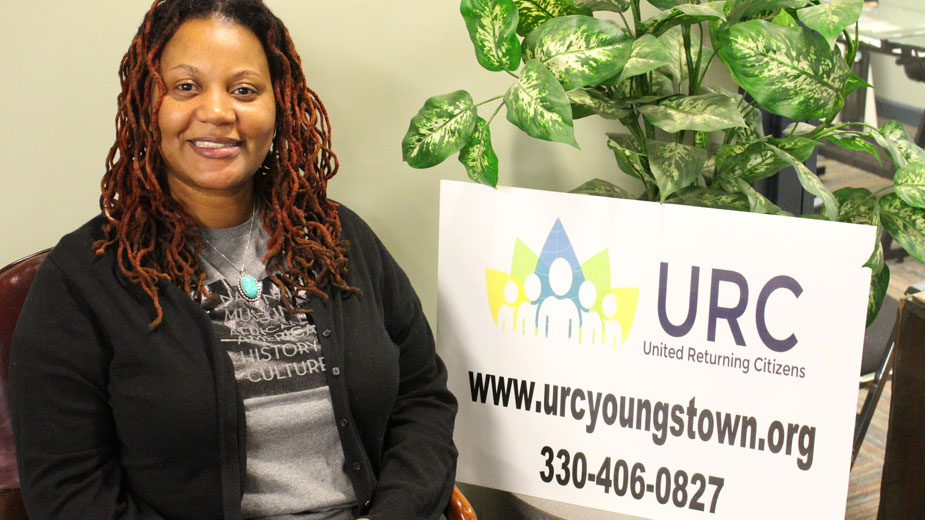
United Returning Citizens provides ex-felons a safe place to transition from prison to civilian life, says Dionne Dowdy, executive director.
In the four years of its existence, URC has served some 800 individuals with a 46% success rate, Dowdy says. She doesn’t give up on those who don’t make the transition right away and gives them the tools to help them grow until they’re ready to come back, she says.
“For some of them, they don’t get right away what they need, so they leave,” she says. “You just have to meet people where they are.”
Self-sufficiency begins with an identification card, a medical card and a place to stay. The ID card is especially necessary when looking for a job, says Shalise White, housing director for URC.
“It’s kind of sticky when you’re getting out of prison to get an ID,” White says. “You don’t have a Social Security card. You don’t have a birth certificate. You can’t get the ID without those two.”
URC provides funding for the necessary documentation, White says. To help clients establish a stable home life, URC partners with organizations such as Coleman Professional Services to supplement security deposits and up to six months of rent, depending on eligibility.
Whether clients want a job or have a business idea, URC helps them identify their interests and their “end goal,” White says. Staff work with clients to identify the viability of a business and put together a plan. So far, URC has helped ex-felons establish eight businesses in Youngstown.
“Some of them are the most creative people you’ve ever seen,” Dowdy says. “They’ve just never been given the chance to do that or see that.”
The idea for Community Farmers Market began with a conversation two years ago between Littles and his partner, Tysha Wilson.
“It started with my childhood,” Wilson says. “This is what I like to do, and with Danielle. He has a great business mind.”
As a lactation consultant, Wilson told Littles about the health benefits of eating organic, non-GMO foods. “I took that information and $300 and I bought some produce,” Littles says.
He sold produce at reduced prices with a pop-up market along Meridian Road. URC helped him complete his business plan and market the company, which expanded to the storefront that he and Wilson operate today. The company serves residents who live in food deserts without transportation to grocery stores, he says, including residents at International Towers apartments downtown.
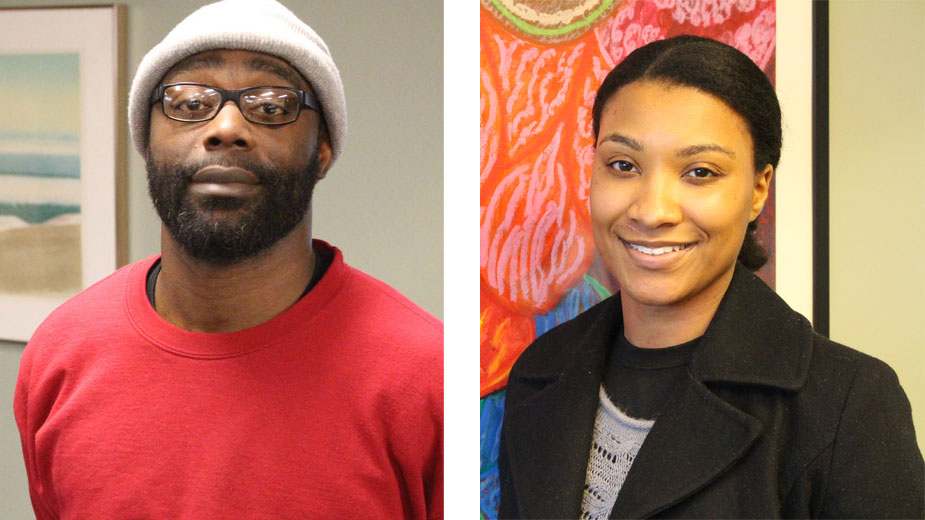
Danielle Littles and Tysha Wilson, Community Farmers Market, are collaborating with URC on the Growing Our Own Development (GOOD) Project.
For 2019, he and Wilson are working with Dowdy and Taft Promise Neighborhood on the Growing Our Own Development, or GOOD, Project, a tomato farm at 730 E. Avondale Ave. across from Taft Elementary School. After growing the tomatoes, they will teach neighborhood kids to make sauce, tomato paste, pizza sauce and salsa, then can and sell the products.
“Not all of the kids are going to be the best gardeners,” Wilson says. “But they can be, as I call them, ‘sauce bosses.’ ”
The project is driving Littles to expand his business as well, including growing his own produce rather than buying from other farmers, he says.
“I wouldn’t have even done it without URC,” he says. “I came down here looking for a job and I got inspired to start a business.”
Impact Maker
Clare Puskarczyk, EFT tap therapist and volunteer
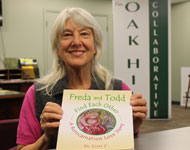
Tap Therapy Relieves Former Inmates’ PTSD
Clare Puskarczyk begins tapping the side of her palm, or the “karate chop” point, reciting a statement of affirmation.
“Even though this is happening, I still love and accept myself.”
She repeats the affirmation three times before moving to the next tap point, the top of her head. The process continues to her eyebrow, side of her eye, under her eye, under her nose, on her chin, the beginning of her collarbone and under her arm, reciting the affirmation at each spot.
The process is called emotional freedom technique, or EFT, and is an alternative treatment for physical pain or emotional distress. For the former prisoners engaged in programming at United Returning Citizens, it helps alleviate the symptoms of post-traumatic stress disorder, or PTSD, she says. And in some cases, it helps get rid of it entirely.
“Trauma is imprinted in the body,” she says. “So you need to release it from the body’s system. And this is one way to do it.”
Puskarczyk volunteers at United Returning Citizens, or URC, and conducts art and tap therapy sessions out of her apartment. The three-part therapy session encompasses sound-therapy with a crystal toning bowl, EFT and art therapy.
During EFT, the person taps while thinking about something that is causing distress and recites a “positive, loving affirmation” about the issue, she says. The tapping should be hard enough to resonate on the person’s bone. After the therapy sessions, clients are feeling “really good,” she says.
“They felt like they resolved what was sort of on their mind at the time that was problematic,” she says.
Emotional freedom technique is based on Chinese acupuncture and is nationally recognized as a treatment for PTSD. In 2017, a study of 448 EFT practitioners found that 63% of them reported that even complex PTSD can be remediated in 10 or fewer EFT sessions. Some 65% of the practitioners found that more than 60% of PTSD clients are fully rehabilitated and 89% say that less than 10% of clients make little or no progress. The study was published by the U.S. National Library of Medicine National Institutes of Health.
Puskarczyk earned her doctorate in consciousness studies from the California Institute of Integral Studies in San Francisco. She’s also a published author and released her latest book in November, “Freda and Todd Find Each Other: A Reincarnation Love Story.”
She met URC Executive Director Dionne Dowdy while attending a function at the Unitarian Universalist Church on Elm Street. After volunteering at URC for a computer program, she spoke with Dowdy about using EFT to treat clients with PTSD.
Dowdy was interested in trying the treatment for her own PTSD, which she attributes to traumatic events during her childhood, she says. Prison creates its own traumatic experiences, but for those who endured trauma during the childhood, being incarcerated can exacerbate those issues, she says.
“It’s bad around here,” Dowdy says of the prevalence of PTSD. “I don’t think they take it as serious as it is.”
A study from psychologists at the University of Wisconsin at Milwaukee found a connection between PTSD and prison. The study reports that incarceration nearly doubles the risk that a male inmate will suffer from PTSD.
“There’s no way that you wouldn’t. It’s trauma,” Puskarczyk adds.
Dowdy and three others took part in a session that was “very successful,” Puskarczyk says. Since then, she has been working with clients at URC who need help making the transition back to civilian life, which can be overwhelming and frustrating.
“The first emotion that they have is anger,” Dowdy explains. “So we have to give them different skills and tools to cope with that so they can transition and live a normal life.”
One URC client who has benefited from the therapy is Lamar Adams, CEO and lawn care manager for URC Lawncare LLC. After serving four years in prison, Adams came to URC from Community Corrections Association Inc. on the south side of Youngstown.
“It was my first time being incarcerated for that long; my first felony,” Adams says. “I just couldn’t see myself living that way.”
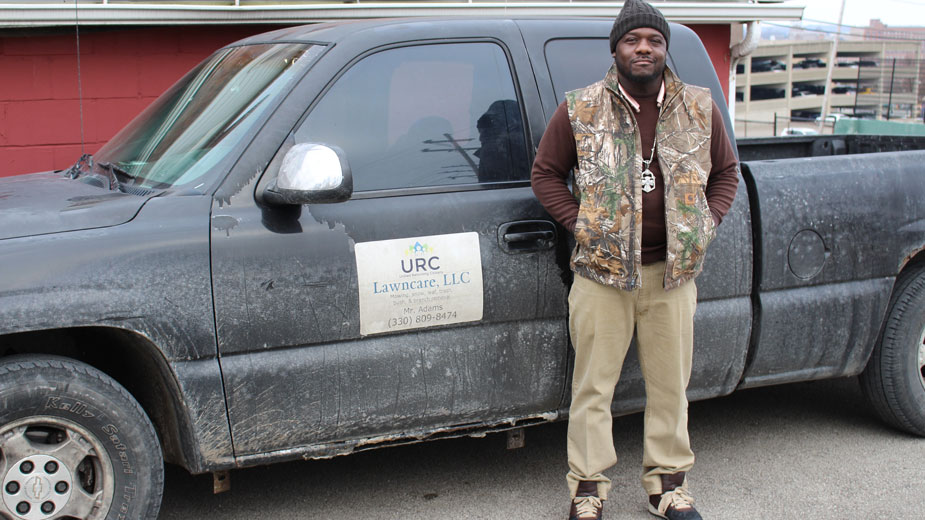
In 2016, Lamar Adams started URC Lawncare LLC and has since built a clientele of about 80.
He had been working at Belmont Confections in Liberty Township for about six months after being released. While it provided an income, it wasn’t what he wanted to do, he says. He earned enough money to buy a pick-up truck and a push lawn mower, and he told Dowdy that he wanted to start a lawn-care business.
While working with URC on getting his lawn-care business started, Adams was contacted by someone from his past who caused him distress, Dowdy says. URC connected Adams to Puskarczyk for therapy to help with his emotional issues and trained him in life skills, all to help keep him from returning to the life he used to live.
“Sometimes they just need a safe place to talk things through,” Dowdy says. “Or someone just to hear their point of view.”
With URC help, Adams got his lawn-care business off the ground in 2016 and secured his first three customers: Dowdy’s mother, aunt and her best friend. Dowdy helped him find employees – he employs six – acquire new equipment and find work with city properties, mowing vacant lots and lawns of abandoned houses.
“With the city alone last year, I probably had 60 properties I had to maintain,” Adams says. “Residential, I probably had about maybe 70 or 80 customers.”
Adams is on track to enjoy his first year with a profit, and 2019 is “looking real good,” he says.
“A lot of people come home from prison and they feel like they’re beneath everyone because of their record,” he says. “But that’s not really the truth. And I’m living proof of that.”
For Puskarczyk, helping people at URC alleviate their distress and get on a path toward living a normal life “means everything,” she says.
“Anywhere I can help with PTSD, I want to do that.”
CLICK HERE for a 3 Minutes With interview with Puskarczyk on the benefits of tap therapy for treating PTSD.
URC is open from 10 a.m. to 2 p.m. daily for anyone looking to start a business. Its offices are in the Oak Hill Collaborative, 507 Oak Hill Ave., where entrepreneurs can use equipment in the computer lab and MakerSpace of the collaborative, including 3D printers, woodworking equipment and hand tools. URC staffs a housing director, secretary and program director, all of whom are paid minimally or nothing at all, Dowdy says.
“They believe in what they’re doing,” Dowdy says. “They do it because they have brothers, uncles, fathers who are in the same situation.”
URC works with other area agencies, including the city of Youngstown, Youngstown Metropolitan Housing Authority, Mercy Health – Youngstown and Community Legal Aid, of which Dowdy was recently named board president. Together with the housing authority, URC launched in June the EnVision Center at Rockford Village on the east side of the city. Taft Promise Neighborhood hosted a felon-friendly job fair at the center, which saw 18% of felons there find a job.
“To some people, that’s small,” she says. “But to me, that’s four or five people that I know who can now either help support a family or take care of a family.”
Not everyone who comes to URC is an ex-felon. URC helped Priscilla Davis convert her restaurant at 3663 Powers Way into Hilltop Market, where she offers fresh produce, dairy and frozen, canned goods and some frozen meats and fish, as well as prepared food during lunch hours.
URC is helping in developing her new business, Little Indian Mobile Meals, which will distribute home-cooked meals to senior citizens in the community, Davis says. She looks to launch the business this month and URC is helping develop her clientele.
“My goal is to have at least 50 clients by the end of 2019,” Davis says. “[Dowdy] has been awesome. Every time I have a question, I can give her a call and she gives me the correct answers. It’s a blessing.”
Established entrepreneurs can also find help at URC. On Feb. 2, Ohio Wholesale Liquidators will open at 2203 Market St., says Aaron Griffin, principal and sales and purchasing director. The company offers underpriced building supplies to local contractors and repairmen as well as homeowners who need to make home repairs but can’t afford materials at big-box retailers or don’t have transportation to get there.
“Stambaugh-Thompson was right there on the corner of Indianola and Market Street for years,” he says. “I want to bring the hardware industry back into the city.”
Ohio Wholesale Liquidators isn’t Griffin’s “first rodeo in business,” he says. He and his family owned and operated the former Seafood Palace on the east side of Youngstown. But after being incarcerated from 2001 to 2006, establishing a business wasn’t easy, he says.
“Other people just write you off,” Griffin says. “To be honest, it doesn’t even matter what your crime is a lot of times. They just don’t want you there.”
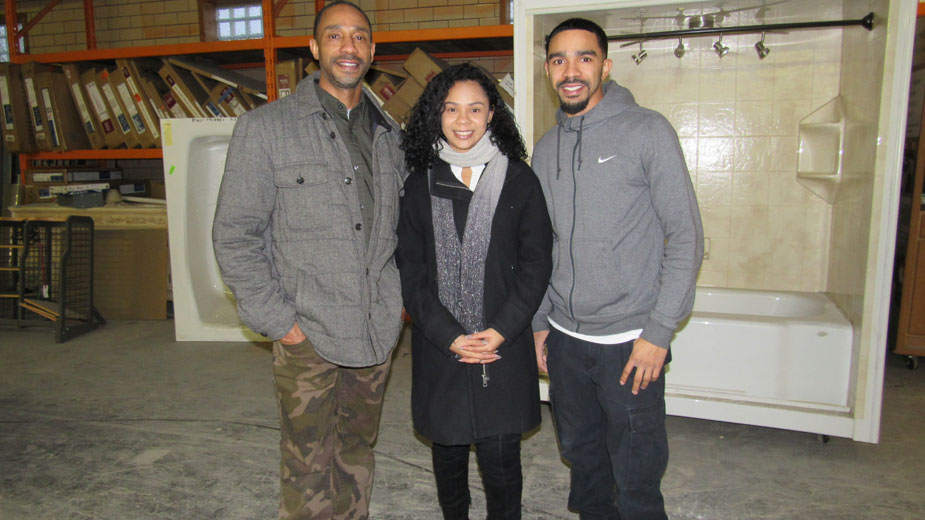
Aaron Griffin started Ohio Wholesale Liquidators to eventually leave to his children, Shanice and Aaron Jr., who work with him.
Financing is a major challenge, he says, because some people might not trust ex-felons enough to co-sign on a loan. Banks are also reluctant to lend money to ex-felons, he says.
“And if they do, the first mistake that you make they want to come and take what they let you borrow,” he says.
Over time, Griffin learned how to obtain lines of credit to finance his company. He was able to fund the nearly $14,000 in renovations to the building, and three credit lines will allow him to stock his store in time for the grand opening, he says.
URC is helping Griffin market Ohio Wholesale Liquidators and plan his next venture, Global Impact Community Development, a housing development company. Griffin has 15 years of experience in housing and plans to purchase land by using revenue from Ohio Wholesale Liquidators.
“Housing is my forte,” he says. “That’s one of the reasons we’re jumping out in front of the housing market into building supplies because we know how much money we spent on renovating homes.”
Griffin’s son, Aaron Jr., is part owner of Ohio Wholesale Liquidators and his daughter, Shanice, will head an in-store DIY training program for kids with Griffin’s fiancee, Alisa Humbert.
“I work for my family,” Griffin says. “My family believed in me and they have supported me when I returned to assist me to get up on my feet.”
Despite Griffin’s past, he restored a building that was “probably demolition-ready” and is bringing a new business to Youngstown, White says.
“We haven’t had a hardware store of this magnitude within city limits,” White says. “It’s huge and it’s something new. It’s modern. It’s fresh.”
Through its efforts, URC is proving to former felons that they can be a success and also alleviating misconceptions that employers and the community might have about ex-felons, she says.
“They think that they’re a certain type of person. But we are changing that,” White says. “Most of the people who work at United Returning Citizens are in very high positions, and they are ex-felons. We’re changing what it looks like.”
CLICK HERE for a 3 Minutes With interview with White about the misconceptions ex-felons face in the workforce.
How You Can Help
Community members can make an impact by helping United Returning Citizens by donating or volunteering their time.
Donations help fund operating costs and improve the ability of URC to provide the most efficient services to those who benefit from its work. The organization is raising funds in an effort to attain operating sufficiency and to increase its overall budget.
Credit card donations can be made online at UnitedReturningCitizens.org/donate, and checks can be mailed to United Returning Citizens, 507 Oak Hill Ave., Youngstown, Ohio 44502. All donations are tax deductible.
Volunteers can visit URC during its operating hours Monday through Friday from 10 a.m. to 2 p.m., Monday through Friday or by calling 330 406 0827 and meeting with Executive Director Dionne Dowdy or her staff.
“I like to see where you fit in,” Dowdy says of the organization’s volunteers. “What is your gift? What is your strength? And whatever it is, that’s what you can use to help United Returning Citizens.”
Copyright 2024 The Business Journal, Youngstown, Ohio.

